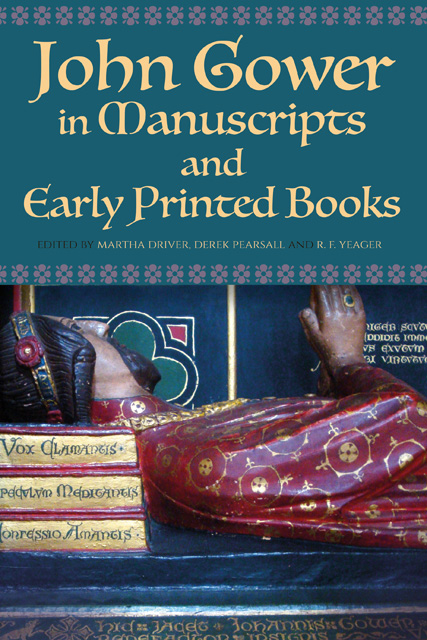39 results
List of Illustrations
-
- Book:
- John Gower in Manuscripts and Early Printed Books
- Published by:
- Boydell & Brewer
- Published online:
- 18 January 2023
- Print publication:
- 17 April 2020, pp vii-x
-
- Chapter
- Export citation
List of Abbreviations
-
- Book:
- John Gower in Manuscripts and Early Printed Books
- Published by:
- Boydell & Brewer
- Published online:
- 18 January 2023
- Print publication:
- 17 April 2020, pp xvii-xvii
-
- Chapter
- Export citation
Contents
-
- Book:
- John Gower in Manuscripts and Early Printed Books
- Published by:
- Boydell & Brewer
- Published online:
- 18 January 2023
- Print publication:
- 17 April 2020, pp v-vi
-
- Chapter
- Export citation
Acknowledgements
-
- Book:
- John Gower in Manuscripts and Early Printed Books
- Published by:
- Boydell & Brewer
- Published online:
- 18 January 2023
- Print publication:
- 17 April 2020, pp xi-xii
-
- Chapter
- Export citation

John Gower in Manuscripts and Early Printed Books
-
- Published by:
- Boydell & Brewer
- Published online:
- 18 January 2023
- Print publication:
- 17 April 2020
Frontmatter
-
- Book:
- John Gower in Manuscripts and Early Printed Books
- Published by:
- Boydell & Brewer
- Published online:
- 18 January 2023
- Print publication:
- 17 April 2020, pp xviii-xviii
-
- Chapter
- Export citation
Volumes Already Published
-
- Book:
- John Gower in Manuscripts and Early Printed Books
- Published by:
- Boydell & Brewer
- Published online:
- 18 January 2023
- Print publication:
- 17 April 2020, pp 304-304
-
- Chapter
- Export citation
Part II - In Print
-
- Book:
- John Gower in Manuscripts and Early Printed Books
- Published by:
- Boydell & Brewer
- Published online:
- 18 January 2023
- Print publication:
- 17 April 2020, pp 167-168
-
- Chapter
- Export citation
List of Contributors
-
- Book:
- John Gower in Manuscripts and Early Printed Books
- Published by:
- Boydell & Brewer
- Published online:
- 18 January 2023
- Print publication:
- 17 April 2020, pp xiii-xvi
-
- Chapter
- Export citation
Bibliography
-
- Book:
- John Gower in Manuscripts and Early Printed Books
- Published by:
- Boydell & Brewer
- Published online:
- 18 January 2023
- Print publication:
- 17 April 2020, pp 263-288
-
- Chapter
- Export citation
Index
-
- Book:
- John Gower in Manuscripts and Early Printed Books
- Published by:
- Boydell & Brewer
- Published online:
- 18 January 2023
- Print publication:
- 17 April 2020, pp 289-303
-
- Chapter
- Export citation
Frontmatter
-
- Book:
- John Gower in Manuscripts and Early Printed Books
- Published by:
- Boydell & Brewer
- Published online:
- 18 January 2023
- Print publication:
- 17 April 2020, pp i-iv
-
- Chapter
- Export citation
Part I - In Manuscript
-
- Book:
- John Gower in Manuscripts and Early Printed Books
- Published by:
- Boydell & Brewer
- Published online:
- 18 January 2023
- Print publication:
- 17 April 2020, pp 11-12
-
- Chapter
- Export citation
Mental health in UK Biobank – development, implementation and results from an online questionnaire completed by 157 366 participants: a reanalysis
-
- Journal:
- BJPsych Open / Volume 6 / Issue 2 / March 2020
- Published online by Cambridge University Press:
- 06 February 2020, e18
-
- Article
-
- You have access
- Open access
- HTML
- Export citation
Health screening, cardiometabolic disease and adverse health outcomes in individuals with severe mental illness
-
- Journal:
- BJPsych Open / Volume 5 / Issue 6 / November 2019
- Published online by Cambridge University Press:
- 08 November 2019, e97
-
- Article
-
- You have access
- Open access
- HTML
- Export citation
Mental health in UK Biobank: development, implementation and results from an online questionnaire completed by 157 366 participants — RETRACTED
-
- Journal:
- BJPsych Open / Volume 5 / Issue 4 / July 2019
- Published online by Cambridge University Press:
- 17 June 2019, e56
-
- Article
-
- You have access
- Open access
- HTML
- Export citation
Mental health in UK Biobank: development, implementation and results from an online questionnaire completed by 157 366 participants – CORRIGENDUM
-
- Journal:
- BJPsych Open / Volume 4 / Issue 5 / September 2018
- Published online by Cambridge University Press:
- 15 August 2018, pp. 352-353
-
- Article
-
- You have access
- Open access
- HTML
- Export citation
Mental health in UK Biobank: development, implementation and results from an online questionnaire completed by 157 366 participants – CORRIGENDUM
-
- Journal:
- BJPsych Open / Volume 4 / Issue 3 / May 2018
- Published online by Cambridge University Press:
- 19 April 2018, p. 136
-
- Article
-
- You have access
- Open access
- HTML
- Export citation
RETRACTED – Mental health in UK Biobank: development, implementation and results from an online questionnaire completed by 157 366 participants
-
- Journal:
- BJPsych Open / Volume 4 / Issue 3 / May 2018
- Published online by Cambridge University Press:
- 03 April 2018, pp. 83-90
-
- Article
-
- You have access
- Open access
- HTML
- Export citation
12 - The Ends of Storytelling
-
- Book:
- Traditions and Innovations in the Study of Medieval English Literature
- Published by:
- Boydell & Brewer
- Published online:
- 05 September 2013
- Print publication:
- 18 July 2013, pp 188-201
-
- Chapter
- Export citation

